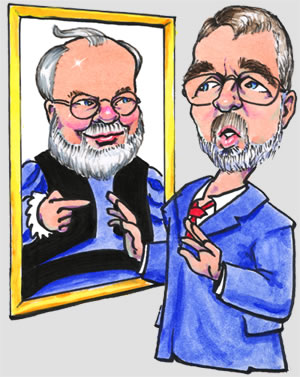My Falstaff Moment
Would I Were Young For Her Sake
Rush hour, end of the day. The D.C. Metro train was crowded, standing-room only, but I got on, gripping a bag stuffed with stuff in one hand while my laptop backpack clung to my shoulder blades like a boulder perched on a Bryce Canyon ledge. I wasn't just tired, I was drained: nary a feeling remained in my body except some pride and my ever-present libido.
I didn't notice her at first, even though she was attractive, in her 20s or maybe 30, and exuding sexual charm. It wasn't until she tapped my arm and I glanced down at this young woman gazing up and smiling at me that I felt a surge of electricity course through my capillaries. I knew that look: she wanted me. Bad. Or, as Falstaff says of Mistress Page in The Merry Wives of Windsor, “O, she did so course o'er my exteriors with such a greedy intention that the appetite of her eye did seem to scorch me up like a burning-glass” (I.3.46).
“Excuse me, sir,” the young woman said in a voice that pleased. “Would you like my seat?” After the flash of time it took for my libido to shrivel and my pride to dissipate, I said no thank you, though that backpack suddenly felt like two boulders. Thus, was my humiliation made complete.
 This was my Falstaff moment, a feeling like the humiliation he endures at the hands of Mistresses Page and Ford.
This was my Falstaff moment, a feeling like the humiliation he endures at the hands of Mistresses Page and Ford.
I'm not comparing myself in wit, wisdom, or wherewithal (or width, for that matter) to Shakespeare's genius comic creation. The only attribute we share is that we are men circa 50 (or older) thinking we are still men circa 20. This false self-rendering led to Falstaff's comeuppance at the end of The Merry Wives of Windsor and to my moment on the Metro where I learned unequivocally that I am no longer in the game—indeed, that I was probably taken out of the game awhile back but didn't know it.
Nor is the psychological devastation no less than what Falstaff feels in his public humiliation. Note that, even before his final fall, Falstaff worries earlier in the play that if his mischances with the two wives “should come to the ear of the court…I warrant they would whip me with their fine wits till I were as crestfallen as a dried pear” (IV.5.68). He was right there: when I told a friend the next morning what happened to me on the Metro, I was subjected to much teasing from other workmates by lunchtime.
This isn't about failure to get the girl, in either my or Falstaff's case. Rather, it's all about a self-image wherein failure is pre-ordained. We're talking about that gray area between reality and fantasy and the psychosis that resides there, and how that psychosis is fed by an internal self-reflection that doesn't keep up with the reflection in the mirror—indeed, it ends up lagging several decades behind. Some guys think they've still got game in an athletic sense and some guys, like me, still think we're players in the field of seducing women: any and all women.
The reality is that even when I was 20 I wasn't a player (oh, but I could have been). The reality is that I would never have hit on the woman on the Metro even if she hadn't offered me her seat (oh, but she could have wanted me, nonetheless). The reality is that Sarah, my wife, will tell you that when she meets my women friends and associates for the first time they invariably greet her with “I've heard so much about you” (oh, but they could be secretly envious of her). The reality is that while I've learned over the years that bragging about my wife does not get me laid with other women, I keep bragging about my wife (oh, but some woman could still make a play for me). The reality is that even in my fantasies, extracurricular activity usually doesn't get much past “hello” (oh, but I could give in to a persistent woman—at least in my fantasies).
It was the realm of the coulds where my circa-20 psychosis lives that disappeared like Atlantis that day on the Metro. Not only was there no could-a-been, there wasn't even a basis for a could-a-been as reality in flashing neon crushed even my fantasies. Whereas I saw the woman on the Metro as my equal in age, she saw me as the equivalent of her grandfather.
Whereas Falstaff “show[s] himself a young gallant,” he is “one that is well-nigh worn to pieces with age,” says Mistress Page (II.1.15). Never mind Falstaff's mercenary motives for courting Mistress Ford and Mistress Page, what matters is that the reality on which he based his pursuit of them was his self-image as 20-something, attractive, and virile that was far from the reality of how the women regarded him. “What tempest, I trow, threw this whale—with so many tuns of oil in his belly—ashore at Windsor?” Mistress Ford asks (II.1.44).
Many critics and Falstaff fans feel Shakespeare mistreats his comic creation horribly in Merry Wives, so much that they claim it's not the same character that dominates the two Henry IV plays. The character is the same, but he's put in a different situation where his self-image and the reality of middle class Windsor play in starker contrast. His schtick may fly with the ruffians and whores of Eastcheap and bemuse Prince Hal in the Henry plays and is even acceptable with Master Page in Merry Wives. But the merchant wives of Windsor aren't taken in. Falstaff both overestimates the impression he makes on them and underestimates their intelligence and morality.
Ironically, he does make a good first impression on them. “He would not swear, praised women's modesty, and gave such orderly and well-behaved reproof to all uncomeliness,” Mistress Ford says of her first meeting with Falstaff at the previous evening's dinner party (II.1.40). But then he misjudges their respectful regard for him—“I was then frugal of my mirth,” Mistress Page says (II.1.19)—as sexual want.
I've done that. A lot. The woman on the Metro smiling up at me: oooh, she wants me. The acquaintance who broke into a big grin whenever she saw me: ahhh, she's begging me to ask her out. The friend who squeezed tight when she hugged me: hmmm, does she want more than a hug? Here's Falstaff on Mrs. Ford: “I spy entertainment in her. She discourses, she carves, she gives the leer of invitation. I can construe the action of her familiar style, and the hardest voice of her behavior—to be Englished rightly—is ‘I am Sir John Falstaff's'” (I.3.30). Even the swaggerer Pistol responds in an aside to fellow ruffian Nym, “He hath studied her well and translated her will out of honesty into English.” Falstaff's overleap of Mistress Page's “frugal of my mirth” is even more self-deluding: “Even now [she] gave me good eyes, too, examined my parts with most judicious oeillades. Sometimes the beam of her view gilded my foot, sometimes my portly belly” (I.3.41). He continues this self-view in a later conversation with Mistress Quickly: “Setting the attraction of my good parts aside, I have no other charms” (II.2.99). Note that “charms” here is of the sort witches might cast, not personality; the spell with which he thinks he binds the wives is his very being, nothing more. That sounds like my kind of humility, frankly.
On his imaginings, Falstaff proceeds. That's where he and I diverge. He acts. I wait for more clues, then I wait for more confirmation. Having never gotten to the confirmation stage with anybody other than Sarah, I'm not sure how much evidence or levels of confirmation would be needed to get me to act on my imaginings. I'm supported in my caution by Mistress Ford's own behavior. As Falstaff woos her she replies with such equivocating comments as “Heaven knows how I love you, and you shall one day find it.”
And yet, my experience and Falstaff's still converged in the end: he at Hernes Oak in Windsor Park—“Why Sir John, do you think though we would have thrust virtue out of our hearts by the head and shoulders, and have given ourselves without scruple to hell, that ever the devil could have made you our delight?” says Mistress Page (V.5.126); me on the Orange Line in Arlington, Virginia—“Would you like my seat?” (Vienna-bound train, second car, 5:18 p.m.). True, the former was the ultimate insult offered by a trickster woman to an old lecher while the latter was a kind gesture offered by a polite woman to an old, um, man. Still, despite her best of intentions, the Metro rider's offer had the same effect on me as the Windsor crowd's excoriations had on the deflated Falstaff: “This is enough to be the decay of lust,” he says at V.5.124, and, a few lines later “I am dejected.”
When I, dejected, walked out of the Metro station to where Sarah was waiting to pick me up, I got in the car and told her what happened. “Ohhh, I'm so sorry,” she said, genuinely, and placed her hand on my thigh. Since that day, in my mind I have no longer been a hot 20-something player, but in my reality I am a lucky 50-something gentleman. And I'm still in Sarah's game.
Eric Minton
March 23, 2012
Comment: e-mail [email protected]
Start a discussion in the Bardroom



 Find additional Shakespeareances
Find additional Shakespeareances